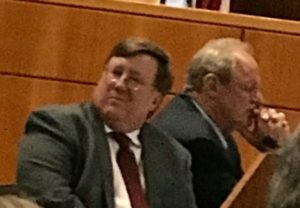Did SLO County contractor pocket collected sales tax?
January 23, 2019
 By Cal Coast Times Staff
By Cal Coast Times Staff
A former contractor with intimate connections to San Luis Obispo’s County’s scandal-ridden waste disposal agency habitually collected sales tax on items he sold to the agency, then appears to have failed to remit those taxes as required, according to state, county, and city records. [Cal Coast Times]
At the same time, contractor Charles K. Tenborg was billing the Integrated Waste Management Authority (IWMA), a public entity, for trucks and other materials for his private business. Even though some of the purchases exceeded $60,000, they were made without board approval, according to IWMA records.
IWMA Program manager Patti Toews said last week that Tenborg regularly charged the IWMA sales tax.
In one illustrative July 2016 example, one of Tenborg’s companies, the Cleaner Earth Company, charged the IWMA $21,541 for used hypodermic needle containers, and collected $1,566 earmarked as San Luis Obispo city sales tax.
However, San Luis Obispo received no sales tax from the Cleaner Earth Company in 2016, according to Jon Ansolabehere, an assistant city attorney.
California’s Department of Tax and Fee Administration approved a seller’s permit for Cleaner Earth Company in July 2012. Sellers pay the sales tax to the state, which then sends the municipality their allocated share.

Charles Tenborg
Tenborg did not respond to a reporter’s efforts to contact him for comment.
The IWMA is the result of a joint powers authority (JPA) between the county and its seven cities, representatives of which make up the agency’s governing board.
Rampant spending of public funds by the agency’s former manager William Worrell, other employees, and contractors has resulted in an ongoing criminal investigation by the San Luis Obispo County District Attorney’s office. Worrell then retired, suddenly and early.
IWMA’s board made little effort at oversight of the questionable expenditures over the last decade, according to former member Tim Brown.
One issue currently under examination is the IWMA’s purported authorization for purchase of trucks and equipment for Tenborg’s companies.

IWMA Administrator Bill Worrell and legal counsel Ray Biering listening to allegations of misappropriation of funds
Since 2008, the IWMA has passed eight ordinances, the legality of which is now being questioned. Many of those ordinances resulted in a steady income stream for Tenborg’s companies.
In 2008, the IWMA passed an ordinance mandating a hypodermic needle waste disposal program. According to the ordinance, the cost associated with the handling and disposal of the home-generated needles was to be borne by both the user and the retailer providing the needles. The ordinance specifically prohibits government monies, including government grants, to be spent on the handling and disposal of needles.
Nevertheless, the IWMA purchased used needle containers from Tenborg for the program, according to IWMA records.
The 2008 ordinance also provided that retailers could utilize private or nonprofit businesses to dispose of the sharps. But instead, the IWMA set appointments for Tenborg’s companies to pick up the needles, billed the retailers, and then provided Tenborg’s companies the payments.
In 2018, the IWMA board — even while confronting the agency’s misappropriated fund problem — passed a “stewardship” ordinance requiring retailers to use only IWMA approved companies to transport their needles.
The IWMA may not even have the legal authority to pass ordinances. The California Constitution grants only cities and counties the power to pass ordinances — not joint powers authorities such as SLO County’s IWMA.






The comments below represent the opinion of the writer and do not represent the views or policies of CalCoastNews.com. Please address the Policies, events and arguments, not the person. Constructive debate is good; mockery, taunting, and name calling is not. Comment Guidelines